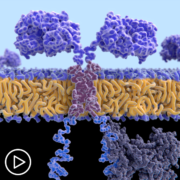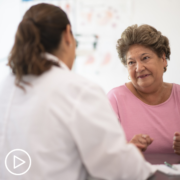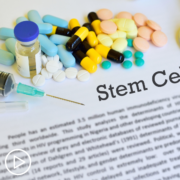Self-Advocacy in Myeloma Care | Advice From an Expert
Self-Advocacy in Myeloma Care | Advice From an Expert from Patient Empowerment Network on Vimeo.
What questions should myeloma patients ask their doctor about a treatment plan? Myeloma expert Dr. Omar Nadeem shares key advice and emphasizes the importance of patients engaging with their healthcare team in treatment decisions.
Dr. Omar Nadeem is the Clinical Director of the Myeloma Immune Effector Cell Therapy Program and Associate Director of the Multiple Myeloma Clinical Research Program at the Dana-Farber Cancer Institute. Learn more about Dr. Nadeem.
Download Resource Guide
Related Resources:

Clinical Trials for Myeloma Treatment | Essential Information for Patients |

|

Personalized Medicine for Myeloma Treatment | What Patients Should Know |
Transcript:
Katherine:
What questions should patients be asking their provider about a proposed treatment plan?
Dr. Nadeem:
Yeah. I think because myeloma therapy’s so nuanced and much of this is still in clinical trials or under investigation about what to do with some of these results, I would say, as a whole, it’s important to know which tests the physician looks at to determine how you’re doing, and kind of what their assessment of that result is. So, for example, if somebody’s had a 50 percent reduction in the amount of abnormal protein in the blood, is that sufficient, or should we be aiming for a number that’s much higher than that?
Some of that depends on kind of where they are in their treatment course, but that’s a very sort of reasonable question to ask your physician is that where do you see my response now, let’s say six months into therapy, and is this adequate, and what is now, after we have all this information, what is my roadmap going forward to try to keep this disease in check?
Katherine:
Yeah. Well, that’s great advice, Dr. Nadeem. Thank you. I’d like to turn to self-advocacy, Dr. Nadeem. Why is it so important that patients engage in their care treatment decisions?
Dr. Nadeem:
Yeah. As I mentioned, myeloma therapy is so individualized now and we can sit here, look at the trial data, get very into the weeds and technical about this therapy with this approach as X or Y higher response rate.
Or MRD-negative rate, but in reality, we’re dealing with people and we’re dealing with people that have lives.
They have all their priorities, and until you share that with us, it’s very difficult for us to know exactly what’s important to you. So, what I may consider to be kind of the “best therapy” for you may not make sense for you because of all the priorities that you may have, and I think it’s so important to advocate for yourself and not be afraid to bring that up to your physician because I think many patients kind of hold that stuff in for a long time because they don’t want it to impact their care. But I would argue the other way around.
Tell us. Tell us exactly what you prioritize. Tell us if you can’t be out of commission for work for X amount of time because of a stem cell transplant. We now have options. We now have options for patients because of all these amazing new therapies for myeloma and we can come up with a very individualized treatment plan for you based on your priorities.
Katherine:
If a patient is feeling like they’re not getting the best care or they’re uncomfortable with the care they’re receiving, what steps should they take to change that?
Dr. Nadeem:
Yeah, I think that’s very difficult because this is a complex system. Medical systems are getting even more and more complex. They’re busy. Everybody’s busy: busy offices, labs, radiology. We’re all feeling that. It doesn’t matter where you are. So, I think it’s important to raise those concerns, number one, to your practice that you’re being seen at because they would like to see that feedback, right? So, kind of see what is something that they can perhaps improve upon. I think it’s always important, like we just said, to advocate for yourself and raise some of these issues and not be afraid of that.
We’re all in this together, right, so I think ultimately, we’re all trying to take the best care of you and we would need to know which part of that may or may not be working so well.
Expert Perspective | Understanding the Recent FDA CAR T-Cell Therapy Warning
Expert Perspective | Understanding the Recent FDA CAR T-Cell Therapy Warning from Patient Empowerment Network on Vimeo.
The Food and Drug Administration (FDA) announced in December 2023 that it is investigating reports of secondary cancers in some patients who have undergone CAR T-cell therapy, noting that “the overall benefits of these products continue to outweigh their potential risks for their approved uses.” Timothy Schmidt, a myeloma specialist, shares his perspective on the recent news.
Dr. Timothy Schmidt is an Assistant Professor in the Department of Medicine, Division of Hematology, Medical Oncology and Palliative Care at the University of Wisconsin School of Medicine and Public Health. More about Dr. Schmidt.
Related Resources:

|

|
Transcript:
Dr. Timothy Schmidt:
So, in terms of the FDA update about CAR T-cell therapies, there was a recent warning, essentially, about an increased risk for a specific type of lymphoma involving T cells. And we don’t really know a whole lot about this just yet. But what we do know is that these events are rare and that we need to investigate it further. I think as of right now, this is not a huge area of concern for most of us, myself included.
When we have patients who are candidates for CAR T-cell therapy in multiple myeloma, generally, this means that patients are in need of a very effective treatment to get their disease under control and to do so for a long period of time. And the potential benefit of this therapy dramatically outweighs any of these kinds of long-term consequences or these newer things that are starting to develop. Now, I do think that this is something that we’re going to need to continue to keep an eye on. And we certainly can’t ignore this, especially as we start to move CAR T-cell therapy into earlier lines of therapy.
But as of right now, I would not weigh this very heavily in my decision whether to do a CAR T-cell therapy for somebody with multiple myeloma.
Questions to Ask Your Doctor About CAR T-Cell Therapy
Questions to Ask Your Doctor About CAR T-Cell Therapy from Patient Empowerment Network on Vimeo.
What should you know when considering CAR T-cell therapy for myeloma? This animated explainer video provides an overview of key questions to ask your healthcare team and advice for patients and care partners when considering CAR T-cell therapy.
Related Resources:

|

|
Transcript:
While receiving a myeloma diagnosis and choosing a therapy can be overwhelming, advancements in research are providing more options and more hope for patients than ever.
And these advancements include CAR T-cell therapy – a treatment in which a patient’s T cells, a type of immune system cell, are laboratory-altered to attack cancer cells in the body.
If you are curious about this option, consider asking your healthcare team these key questions:
- Am I a candidate?
CAR T-cell therapy patients must meet specific criteria.
- What are the risks? Common side effects of this type of therapy are cytokine release syndrome (CRS), neurotoxicity, suppressed immune system, and low blood counts.
- Is the timing right for me? The current approval is for patients who are later in their myeloma journey.
- Are there alternatives? Ask about other treatment options that may be appropriate for your myeloma.
- Is there a clinical trial that may be right for me? There are many myeloma treatments available in clinical trials, there may even be CAR T-cell therapy options.
- What is the cost? Every person’s insurance situation is different so it’s important to understand what the financial impact will be.
- What is the center’s experience with CAR T-cell therapy? Your healthcare team should be well-versed in this type of treatment.
Beyond asking these questions, it’s also critical to research the therapy on your own –– ask your doctor where to find reliable information about the options you are considering.
You should also discuss the pros and cons of each treatment option with your healthcare team, inquiring about potential side effects, and understand how the treatment is administered and the frequency of appointments.
And it’s always a good idea to review your treatment choices with a care partner, such as a friend or loved one – someone you trust.
Finally, always speak up and ask questions. Remember, you have a voice in YOUR myeloma care.
To learn more about myeloma and to access tools for self-advocacy, visit powerfulpatients.org/myeloma.
Accessing Myeloma CAR T-Cell Therapy Clinical Trials
Accessing Myeloma CAR T-Cell Therapy Clinical Trials from Patient Empowerment Network on Vimeo.
How has CAR T-cell therapy changed the landscape of myeloma care? Dr. Brandon Blue shares how this therapy has been a “game changer” in myeloma care, and how clinical trials for newer CAR T-cell therapies are advancing care and access for patients.
Dr. Brandon Blue is Assistant Member and Clinical Instructor in the Department of Malignant Hematology at Moffitt Cancer Center in Tampa, FL. Learn more about Dr. Brandon Blue.
Related Resources:

|

Questions and Considerations When Making Myeloma Treatment Decisions |
Transcript:
Katherine Banwell:
Dr. Blue, we know that the approved CAR T-cell therapies are for patients who have already undergone several lines of treatment. How has this therapy revolutionized care for myeloma patients?
Dr. Brandon Blue:
Yeah. So, CAR T is really a game changer when it comes to multiple myeloma. I’ll tell you that previously people have seen a lot of the best medicines that we have, and unfortunately for a good percentage of people the disease just becomes what we call refractory.
And unfortunately, despite us giving them the best medicines, the disease still likes to survive. So, we had to think of something of what can still kill cancer, but may not be the traditional chemotherapy that people may think of? So, we say, “Well, let’s come up with CAR T because it’s a way to actually use the body’s own immune system to fight off those cancer cells.” And for myeloma it really has shown a lot of progress. And one of the things that we know now is that not only do we have one, but we have two products, and maybe even a third coming down the pipeline because there’s more and more of this CAR T becoming available.
And that’s better, and better for patients.
Katherine Banwell:
Absolutely. That’s great news. For patients who are recently diagnosed, Dr. Blue, is there any chance of accessing this treatment sooner? Maybe through clinical trials.
Dr. Brandon Blue:
Yeah. One of the biggest clinical trials that I think that people are excited about is trying to challenge something that we’ve been doing since the 1980s, which is stem cell transplant.
So, typically, when a person get diagnosed with multiple myeloma, especially newly diagnosed, stem cell transplant is typically part of the treatment plan. But now there’s clinical trials that are coming out where we challenge instead of maybe a patient going to stem cell transplant, maybe they might do CAR T instead. And we’re trying to figure out can something that we’ve been doing since the ‘80s be un-throned as the best standard practice? And so, I think that’s something that people are really excited about, that’s something I’m excited about.
And it gives people who are newly diagnosed a chance to get some of this novel therapy.
Katherine Banwell:
I have a follow-up question about the clinical trials, you mentioned that there is one going on. Where is it taking place?
Dr. Brandon Blue:
Yeah. So, it’s actually a multi-center study. And so, hopefully, we hope to have Moffit Cancer Center involved in that clinical trial, but it’s multiple different sites really all over the world because I think this is a question that everybody’s really excited about. Again, like I said, transplant has been happening since 1980s, and so for some treatment to come along to potentially challenge that, I think people are excited about a new contender. And we’ve already seen the progress that CAR T has already made.
And so, the big question is how well will it work when someone is newly diagnosed before their body has really seen all the extra treatments that are there? Will it work even better?
We’re very hopeful, and we’re very optimistic.
Katherine Banwell:
Where can people find out about this particular clinical trial and other clinical trials?
Dr. Brandon Blue:
Yeah. So, I tell people there’s so many different websites and resources. One of the main ones that is very readily accessible is clinicaltrials.gov, is very kind of easy, and intuitive. Typically, what you can do at clinicaltrials.gov is you can literally kind of just type in your disease process, and then they’ll tell you if it’s newly diagnosed, or relapsed. There’s also a place called SparkCures. SparkCures is fantastic organization that really tries to focus people, and get them matched with clinical trials, which is fantastic.
There’s also HealthTree. HealthTree not only helps people from a clinical trial standpoint, but they also have patient support programs because nobody wants to be in the fight for cancer by themselves. The American Cancer Society does a fantastic job, as well as Leukemia & Lymphoma Society.
The International Myeloma Foundation, or the IMF, and then the MMRF, the Multiple Myeloma Research Foundation. And there’s many more, but those are some of the top ones that we readily use that have a lot of information. And some of them have not only information for the patient, but also information for the family, and the caregivers. Because again, when someone gets diagnosed with cancer it doesn’t just affect the person, it affects the whole family.
Should You Push for a Stronger Myeloma Treatment at Relapse?
Should You Push for a Stronger Myeloma Treatment at Relapse? from Patient Empowerment Network on Vimeo.
Should myeloma patients consider choosing a more aggressive treatment at relapse? Expert Dr. Jeffrey Matous explains the revised approach to choosing treatment at this stage and shares examples of second-line therapies that may be options for relapsed patients.
Dr. Jeffrey Matous is a myeloma specialist at the Colorado Blood Cancer Institute and the assistant chair in myeloma research for Sarah Cannon Research Institute. Learn more about Dr. Matous.
Related Resources:

|

|

|
Transcript:
Katherine:
Kendall writes, “I’m in the maintenance stage following initial diagnosis and treatment. At first relapse, is it appropriate to push for stronger treatment in hopes of a cure?”
Dr. Jeffrey Matous:
Yeah, so the answer to that has changed. The answer is yes, and so, the – it used to be said in myeloma that your best treatment was your first treatment. Then, if you relapsed, that the treatments didn’t work as well, and the remissions did not last as long. Throw it out, so now, we get multiple chances to get really deep remissions in patients, and we should be every bit as greedy when we’re treating relapsed disease, at least initially, as we are when we treat disease at the very beginning. We know, for example, that there are many second-line therapies. I’ll just throw out some examples – daratumumab (Darzalex), pomalidomide dex, daratumumab, Revlimid dex, daratumumab Velcade dex.
Not to mention, the T-cell therapies that can put patients in remissions that are so deep that we can’t even find myeloma cells using very sophisticated molecular techniques, so be greedy.
Questions and Considerations When Making Myeloma Treatment Decisions
Questions and Considerations When Making Myeloma Treatment Decisions from Patient Empowerment Network on Vimeo.
What should be considered when making a myeloma treatment decision? Expert Dr. Jeffrey Matous discusses key factors involved in choosing therapy and provides a list of questions to ask your doctor to guide optimal care.
Dr. Jeffrey Matous is a myeloma specialist at the Colorado Blood Cancer Institute and the assistant chair in myeloma research for Sarah Cannon Research Institute. Learn more about Dr. Matous.
Related Resources:

|

|

|
Transcript:
Katherine:
What factors impact treatment decisions?
Dr. Jeffrey Matous:
Well, there are so many. One of the key ones is fitness, and fitness is a term that myeloma doctors use and rely on tremendously.
And fitness, more or less, falls into a couple different categories. It’s more complex than that, obviously, but generally speaking, it’s too old or too frail, or young and vigorous and I stress to my patients that vigorous or frail is not determined by chronological age. It’s determined by your physiologic age. That’s really critical, so determining what your patient’s overall fitness is, is really important in myeloma. And then, we have to assess the risk of myeloma. I think we’ll talk about this a little bit later, because not all myeloma is the same and we treat myelomas differently depending on risk, certainly. And then, patient preference is a huge part, because there are so many ways to treat myeloma these days that we explore options with the patients and sometimes patients have pretty strong opinions about, you know, one type of treatment or the other, for example.
Katherine:
What testing should take place following a myeloma diagnosis?
Dr. Jeffrey Matous:
Testing in myeloma is multifaceted, because myeloma can affect patients in so many different ways. For example, it involves radiology studies to look for bone disease, urine work to see if the kidneys are affected by myeloma, a lot of blood work, and then, we also do a lot of testing to make sure that we understand the whole health of the patient, because that comes into play so much when we’re making treatment decisions in myeloma.
Katherine:
What advice do you have for patients and caregivers related to working with their healthcare team in choosing a therapy?
Dr. Jeffrey Matous:
Yeah. I think the big thing is to do some research on your own, but really, ask questions when you see your physician. I mean, ask questions about, for example, what are my treatment options? Are there clinical trials that might be available to me? What’s on the cutting edge in myeloma? What are the standard therapies? What are the pros and cons? And a question I often counsel patients to ask when they’re seeking other opinions is if you had 100 people like me and you treated them this way, how many would do well and how many would not do so well, and prognosis, and so forth. And then, the other thing I think is really important sometimes is gauging how experienced your physician is in treating myeloma, because we actually have data that shows that patients who are treated in myeloma centers actually fair a little better than those who are not.
Involving a myeloma expert in your care doesn’t necessarily mean you have to get your care at that center. It just means you may want a myeloma expert on your team. Pretty much every doctor I know welcomes a myeloma person on their team, because the field is so rapidly evolving. It’s really hard to keep up with for a lot of people.




